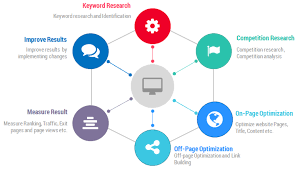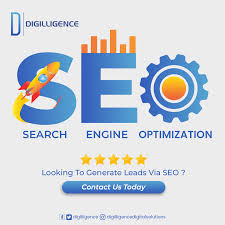Effective SEO Optimization Strategies for Boosting Your Online Presence
In today’s digital landscape, having a strong online presence is crucial for the success of any business. Search Engine Optimization (SEO) plays a key role in improving your website’s visibility and driving organic traffic. To help you navigate the complex world of SEO, here are some effective optimization strategies to boost your online presence:
Keyword Research and Analysis
Keywords are the foundation of any successful SEO strategy. Conduct thorough keyword research to identify relevant terms and phrases that your target audience is searching for. Use tools like Google Keyword Planner or SEMrush to discover high-volume, low-competition keywords that you can incorporate into your content.
On-Page Optimization
Optimizing your website’s on-page elements is essential for improving search engine rankings. Ensure that each page has a unique title tag, meta description, and URL structure that includes relevant keywords. Use header tags (H1, H2, H3) to organize your content and make it more readable for both users and search engines.
Quality Content Creation
Content is king in the world of SEO. Create high-quality, engaging content that provides value to your audience. Incorporate relevant keywords naturally throughout your content and aim to answer common questions or solve problems that your target audience may have.
Mobile-Friendly Design
With the majority of internet users accessing websites on mobile devices, having a mobile-friendly design is essential for SEO success. Ensure that your website is responsive and loads quickly on all devices to provide a seamless user experience.
Link Building
Building high-quality backlinks from reputable websites is crucial for improving your website’s authority and search engine rankings. Focus on acquiring links from relevant sources within your industry through guest posting, influencer outreach, or creating shareable content that naturally attracts links.
Regular Monitoring and Analysis
SEO is an ongoing process that requires constant monitoring and analysis to track the performance of your optimization efforts. Use tools like Google Analytics and Google Search Console to measure key metrics such as organic traffic, keyword rankings, and user engagement to identify areas for improvement.
By implementing these effective SEO optimization strategies, you can enhance your online presence, attract more organic traffic, and ultimately drive business growth in the competitive digital landscape.
Top 6 SEO Optimisation Strategies for Enhanced Website Performance
- Create high-quality, relevant content for your website.
- Optimize your website’s meta tags, titles, and descriptions with relevant keywords.
- Improve your website’s loading speed for better user experience and SEO performance.
- Build quality backlinks from reputable websites to increase your site’s authority.
- Use proper heading tags (H1, H2, etc.) to structure your content effectively.
- Regularly monitor and analyse your website’s performance using SEO tools to make data-driven improvements.
Create high-quality, relevant content for your website.
Creating high-quality, relevant content for your website is a fundamental aspect of effective SEO optimization strategies. By producing content that is informative, engaging, and tailored to the needs of your target audience, you not only enhance the user experience but also improve your website’s visibility in search engine results. Search engines value fresh, valuable content that answers users’ queries and provides solutions to their problems. By focusing on creating content that resonates with your audience and incorporates relevant keywords naturally, you can establish your website as a trusted authority in your industry and attract organic traffic over time.
Optimize your website’s meta tags, titles, and descriptions with relevant keywords.
To enhance your website’s visibility and search engine rankings, it is crucial to optimise your meta tags, titles, and descriptions with relevant keywords. By strategically incorporating keywords that align with your content and target audience’s search queries, you can improve the chances of your website appearing in relevant search results. Crafting compelling meta tags and descriptions not only helps search engines understand the context of your pages but also entices users to click through to your site. This simple yet effective SEO optimization strategy can make a significant impact on driving organic traffic and boosting your online presence.
Improve your website’s loading speed for better user experience and SEO performance.
Improving your website’s loading speed is a crucial aspect of SEO optimization strategies. A faster-loading website not only enhances user experience by providing visitors with quick access to content but also positively impacts SEO performance. Search engines like Google consider page speed as a ranking factor, meaning that faster websites are more likely to rank higher in search results. By optimising your website’s loading speed, you can not only keep visitors engaged but also improve your chances of attracting organic traffic and boosting your overall online visibility.
Build quality backlinks from reputable websites to increase your site’s authority.
Building quality backlinks from reputable websites is a crucial aspect of effective SEO optimization strategies. By establishing links from trusted sources within your industry, you can significantly enhance your site’s authority in the eyes of search engines. These backlinks act as endorsements for your content and signal to search algorithms that your website is a valuable and trustworthy resource. As a result, investing time and effort in acquiring high-quality backlinks can lead to improved search engine rankings, increased organic traffic, and ultimately, greater online visibility for your business.
Use proper heading tags (H1, H2, etc.) to structure your content effectively.
Utilising proper heading tags, such as H1, H2, and so on, is a fundamental aspect of effective SEO optimization strategies. By structuring your content with clear and hierarchical headings, you not only enhance readability for users but also provide search engines with valuable information about the organization of your content. This practice helps search engines better understand the relevance and context of your content, ultimately contributing to improved search engine rankings and visibility for your website.
Regularly monitor and analyse your website’s performance using SEO tools to make data-driven improvements.
Regularly monitoring and analysing your website’s performance using SEO tools is a crucial tip for effective SEO optimization strategies. By leveraging data-driven insights, you can identify strengths and weaknesses in your current approach, track key metrics such as organic traffic and keyword rankings, and make informed decisions to improve your website’s visibility and overall performance. This proactive approach allows you to stay ahead of the curve in the ever-evolving digital landscape and continuously refine your SEO strategy for optimal results.




